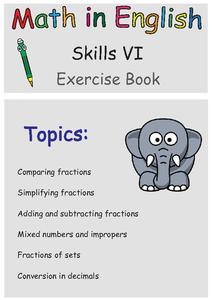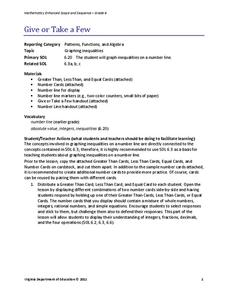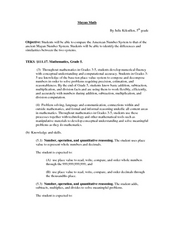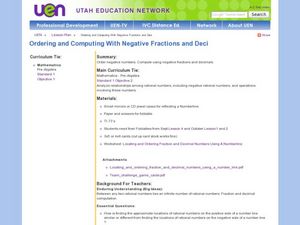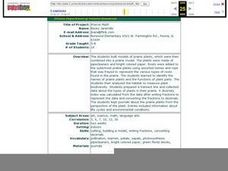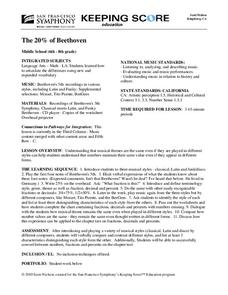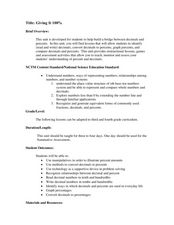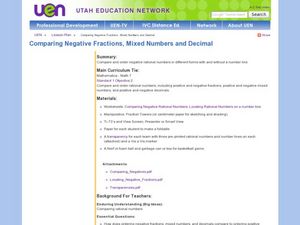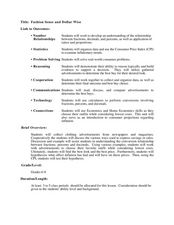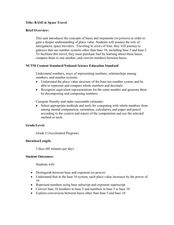Curated OER
Math in English Skills VI Exercise Book
If you need a comprehensive math packet specifically intended for learners who are struggling with fractions, look no further. Individuals will be able to practice comparing, simplifying, adding, and subtracting fractions in an enjoyable...
Noyce Foundation
Sewing
Sew up your unit on operations with decimals using this assessment task. Young mathematicians use given rules to determine the amount of fabric they need to sew a pair of pants. They must also fill in a partially complete bill for...
Inside Mathematics
Marble Game
Pupils determine the theoretical probability of winning a game of marbles. Individuals compare the theoretical probability to experimental probability for the same game. They continue on to compare two different probability games.
EngageNY
Part of a Whole as a Percent
Pupils use visual models, numeric methods, and equations to solve percent problems. To complete the second installment of 20, they find the part given the percent and the whole, find the percent given the part and the whole, and find the...
Curated OER
Plotting Numbers and Test
Sixth graders create a human number line. They determine the correct placement of various numbers ranging from -4 to 4. Additionally, they will determine the placement of numbers written as fractions and/or decimals.
Curated OER
Candy Machine
Using the concept of a candy vending machine, young mathematicians explore the sugar ratios found in different types of candy. Using the provided information, class members calculate and compare different ratios in order to find the...
Virginia Department of Education
Give or Take a Few
Young mathematicians extend their knowledge of rational numbers on a number line to graph inequalities by first using number cards to compare rational numbers. They finish by using similar reasoning to graph inequalities on a number line.
Curated OER
Meter Marker Mania
Students identify integers as rational and irrational numbers. In this algebra lesson plan, students measure and construct number lines using positive and negative integers. They convert between decimals and fractions.
Curated OER
Mayan Math
Fifth graders investigate the Maya's as mathematicians. In this Mayan math lessons, 5th graders work with the ancient Mayan numbering system by comparing it to the American Number System. They tell the differences and similarities...
Curated OER
Fraction Conversion Lesson Plan
Students practice converting fractions into decimals and percents using a computer applet and the concept of money.
Curated OER
Ordering Fractions and Decimals
Students place fractions and decimals with unlike values in correct numerical order.
Curated OER
Ordering and Computing with Negative Fractions and Decimals
Seventh graders explore the concept of computing negative fractions and decimals. In this negative fractions and decimals lesson, 7th graders compare ordering positive fractions to ordering negative fractions. Students use mirrors to see...
Curated OER
Comparing Amount of Rainfall in Different Geographical Areas
Students construct rain gauges and use them to log rainfall in their school zone, local city, and region and then compare and discuss them by plotting this information.
Mathematics Assessment Project
Division
When you divide two integers you can get a decimal form of a rational number that repeats. How do you interpret that number in real-world situations? Her is an example question: What does 2.6666666666 mean in terms of an amount of money?
Curated OER
Prairie Math
Learners work together to build models of prairie plants. Using the model, they estimate the height and then measure them using metric and standard units. They write a fraction to represent their part of the whole set and compare and...
Curated OER
Interactive Fractions
Students determine the common denominator of two unlike fractions. They practice adding fractions and finding equivalent fractions of numbers. They compare and contrast different types of equations involving fractions and construct...
San Francisco Symphony
The 20% of Beethoven
Compare Beethoven's fifth symphony to latin music and disco. Learners will listen to and discuss the elements found in the first part of Beethoven's composition. They'll then look for the same elements in Tito Puente and Bee Gees songs....
Curated OER
Giving it 100%
Students build knowledge about the number relationships between decimals and percents as it relates to converting decimals into percents. In this decimal and percent lesson, students recognize equivalent forms of fractions, decimals, and...
Curated OER
Fraction Conversion 2 (With Percents)
Fifth graders determine how to convert fractions, decimals, and percents. In this conversion instructional activity, 5th graders use an on-line applet to practice making these conversions. They review how to make the conversions in a...
Curated OER
2.0 "Water Is Life" Global Water Awareness Mini-Unit (Grades3-5)
Students study the amount of potable water on the Earth. In this water lesson, students examine the amount of potable water as compared to all the water on the Earth. They discuss why many parts of the world do not have access to good...
Curated OER
Comparing Negative Fractions, Mixed Numbers and Decimal
Seventh graders explore the concept of negative rational numbers. In this negative rational numbers lesson, 7th graders discuss similarities between positive and negative rational numbers. Students predict what rational numbers lie...
Curated OER
Fashion Sense and Dollar Wise
Students work in groups to show understanding of the relationship between fractions, decimals, percentages, and the application of ratios and proportions. In this decimals, fractions, and percents lesson plan, students use real life...
Curated OER
Math: Currency Exchange Rates
Sixth graders apply the division and multiplication of decimals to convert dollars to various international currencies. In a travel simulation activity, they convert money, distance, and temperatures. During their "trip," students...
Curated OER
BASE-ic Space Travel
In this 3-day place-value lesson, upper-elementary kids investigate the base 5 and base 2 systems as an introduction to exponents and powers. They create a pocket chart to help ground their understanding of bases, exponents, and powers,...


